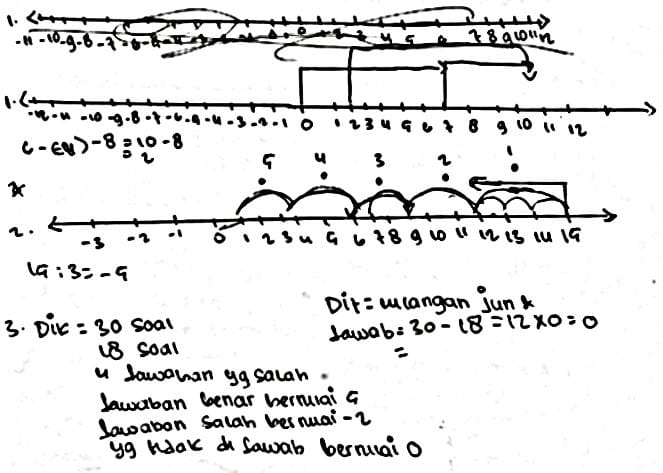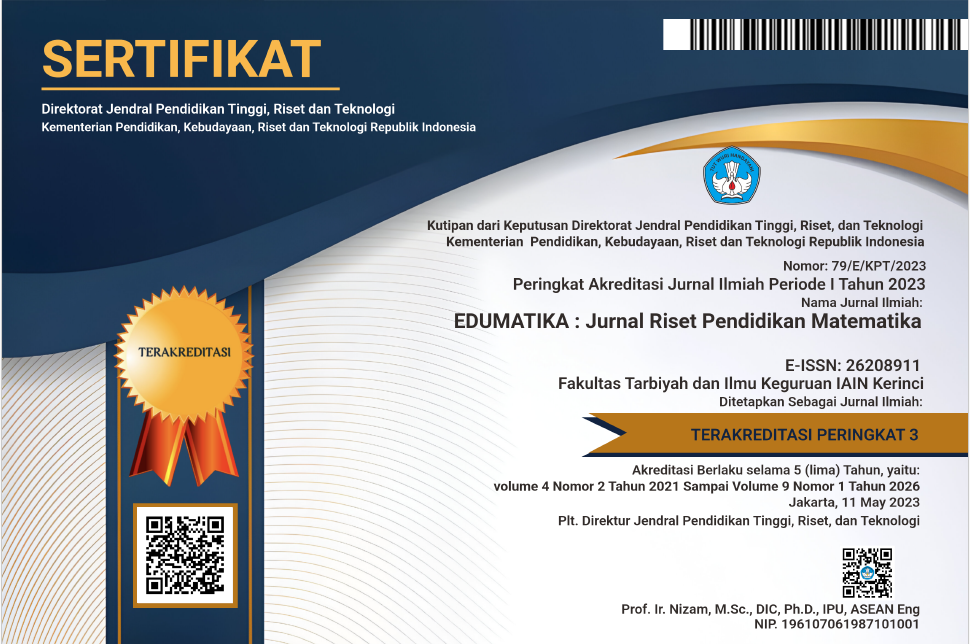The Remediation of Integer Operations Misconceptions for Seventh-Grade Students Through Role-Playing Approach
Abstract
Misconceptions in integer operations remain a common challenge among junior high school students, affecting their understanding of mathematical concepts and procedures. This study aimed to remediate these misconceptions through a role-playing approach that integrates physical and contextual learning experiences. The participants were five seventh-grade students from a junior high school in West Kalimantan, Indonesia, selected based on diagnostic test results and teacher recommendations. A descriptive qualitative design was employed, with data collected through tests, observations, interviews, and documentation. The remediation process was carried out in four systematic stages involving role simulation with physical number lines, group discussions, contextual problem-solving, and reflection. The findings revealed that students successfully overcame conceptual, procedural, and operational misconceptions, while representational misconceptions decreased considerably though still persisted in some students. Role-playing proved effective in fostering engagement and conceptual reconstruction, indicating its potential as an alternative strategy for misconception remediation. Further enhancement of visualization tools, such as number line media or digital supports, is recommended to optimize learning outcomes.
Downloads
References
Akinyode, B. F., & Khan, T. H. (2018). Step by step approach for qualitative data analysis. International Journal of Built Environment and Sustainability, 5(3), 163–174. https://doi.org/10.11113/ijbes.v5.n3.267
Creswell, J. W., & Poth, C. N. (2018). Qualitative inquiry and research design: Choosing among five approaches (4th ed.). Sage Publications.
Distari, D., Yani T, A., & Nursangaji, A. (2018). Miskonsepsi operasi bilangan bulat dengan metode certainty of response index termodifikasi di Kelas VII. Jurnal Pendidikan dan Pembelajaran Khatulistiwa (JPPK), 7(6). https://jurnal.untan.ac.id/index.php/jpdpb/article/view/25911
Duit, R. H., & Treagust, D. F. (2012). Conceptual change: Still a powerful framework for improving the practice of science instruction. In Issues and challenges in science education research: Moving forward (pp. 43-54). Dordrecht: Springer Netherlands. https://doi.org/10.1007/978-94-007-3980-2_4
Fadli, M. R. (2021). Memahami desain metode penelitian kualitatif. Humanika: Kajian Ilmiah Mata Kuliah Umum, 21(1), 33–54. https://doi.org/10.21831/hum.v21i1.38075
Hogan, L. J., & Rutherford, B. K. (2020). Remediation in Maryland Higher Education Part 1: What is Remediation, and Why Does It Matter?. https://mhec.maryland.gov/publications/Documents/Research/PolicyReports/RemediationOverview.pdf
Yen, T. T. K., Nho, H. T., & Huyen, N. T. T. (2022). Teamwork skills education in themed role-playing games in preschool. International Journal of Education and Practice, 10(3), 300-312. https://doi.org/10.18488/61.v10i3.3171
Kurniati, R., Ruslan, R., & Ihsan, H. (2018). Miskonsepsi siswa sekolah menengah pertama (SMP) terhadap bilangan bulat, operasi dan sifat-sifatnya. Inteligensi: Jurnal Ilmu Pendidikan, 1(1), 1–7. https://doi.org/10.33366/ilg.v1i1.1137
Larkin, D. (2012). Misconceptions about “misconceptions”: Preservice secondary science teachers' views on the value and role of student ideas. Science Education, 96(5), 927-959. https://doi.org/10.1002/sce.21022
Manora, E., Yani T, A., & Sayu, S. (2020). Remediasi miskonsepsi siswa dikaji dari gaya kognitif dalam materi bilangan bulat di SMP. Jurnal Pendidikan dan Pembelajaran Khatulistiwa (JPPK), 9(3), 1–8. https://jurnal.untan.ac.id/index.php/jpdpb/article/view/39974
Murni, M., Yeni, M., Saleh, M., & Daus, M. (2023). Difficulties of teaching mathematics with distance learning application systems in high schools. Universal Journal of Educational Research, 2(4), 315–324. https://doi.org/10.17613/q0kb-fn14
Patton, M. Q. (2015). Qualitative research & evaluation methods: Integrating theory and practice. (4th ed.). Sage Publications.
Pekel, F. O., & Hasenekoğlu, İ. (2020). An effective tool to deal with misconceptions: Conceptual change approach. In Krystev, V., Dinu, M. S., Efe, R., & Atasoy, E. (2020). Advances in social science research. ST. Kliment Ohridski University Press. https://unipress.bg/image/catalog/1pdf/44.pdf#page=60
Putri, G. P., Maison, M., & Huda, N. (2021). Studi struktur kognitif miskonsepsi siswa pada materi operasi hitung bilangan bulat. Jurnal Cendekia : Jurnal Pendidikan Matematika, 5(3), 3097–3110. https://doi.org/10.31004/cendekia.v5i3.820
Stylianou, D. A. (2010). Teachers’ conceptions of representation in middle school mathematics. Journal of Mathematics Teacher Education, 13(4), 325-343. https://doi.org/10.1007/s10857-010-9143-y
Vamvakoussi, X., & Vosniadou, S. (2010). How many decimals are there between two fractions? Aspects of secondary school students’ understanding of rational numbers and their notation. Cognition and Instruction, 28(2), 181-209. https://doi.org/10.1080/07370001003676603
Watia, L., Purnama, D., & Nasution, A. R. (2023). Application of the role-playing learning model in improving verbal communication skills of early childhood at RA Al-Mustaqim in Air Meles Atas Village. Asian Journal of Applied Education (AJAE), 2(3), 445–458. https://doi.org/10.55927/ajae.v2i3.4901
Yanala, N. C., Uno, H. B., & Kaluku, A. (2021). Analisis pemahaman konsep matematika pada materi operasi bilangan bulat di SMP Negeri 4 Gorontalo. Jambura Journal of Mathematics Education, 2(2), 50–58. https://doi.org/10.34312/jmathedu.v2i2.10993
Yazici, N., & Şimsek, M. (2022). Examining the scenarios created by pre-service teachers regarding misconceptions that may occur in the teaching process. Acta Didactica Napocensia, 15(2), 356–268. https://doi.org/10.24193/adn.15.2.17

Copyright (c) 2025 Ayu Puspita Zubatasari, Sugiatno Sugiatno, Nurfadilah Siregar

This work is licensed under a Creative Commons Attribution 4.0 International License.














